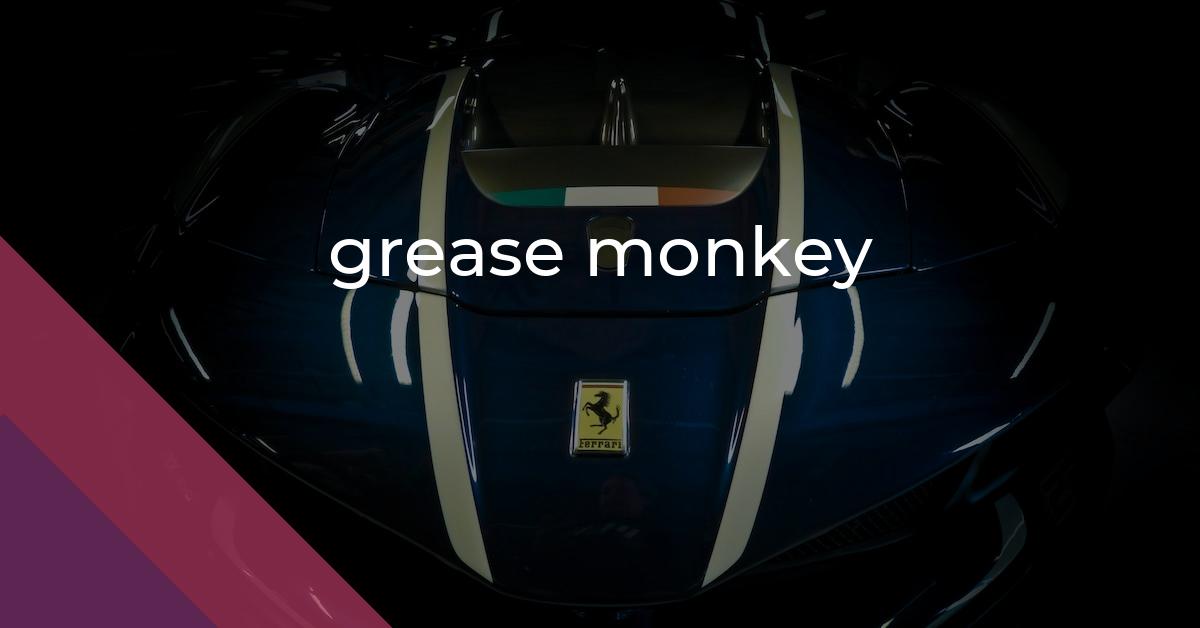grease monkey: Idiom Meaning and Origin
What does ‘grease monkey’ mean?
A "grease monkey" is a slang term for a mechanic, often used to refer to someone who works on cars or machinery. The term stems from the association of mechanics with getting dirty and using grease while working.

Idiom Explorer
The idiom "jerkoff" is a vulgar slang term used to describe someone who is considered foolish, stupid, or annoying. It is an insult that implies a lack of intelligence or worthlessness.
The idiom "I'll be a monkey's uncle" is an expression used to convey surprise or disbelief. It suggests that the speaker never expected the situation or outcome to happen.
The idiom "hired gun" refers to a person who is hired to perform a specific task, often of a questionable or morally ambiguous nature, such as providing professional services, especially those involving violence or illegal activities, in exchange for payment.
The idiom "grunt work" refers to menial or tedious tasks that require little skill or effort. It is often used to describe work that is necessary but not enjoyable or fulfilling.
The idiom "grunt level" refers to the lowest level or position in a hierarchy or organization. It is often used to describe individuals who perform basic, manual labor or tasks that require little skill or expertise.
The idiom "greasy spoon" refers to a small, inexpensive, and often unsanitary restaurant or diner that serves simple, greasy food.
The idiom "grease the wheels" means to provide money or incentives to smooth the progress of a situation or transaction and make it easier or more successful.
The idiom "grease the skids" means to make something easier or smoother, often by using influence or providing assistance.
The idiom "grease someone's palm" means to give or offer someone a bribe or money in order to gain favor, influence or illicitly expedite a desired outcome.
A grease payment is a bribe or illegal payment made to someone in power in order to gain an advantage or get something done, often used in official or bureaucratic situations.
Deciphering the Mechanic's Moniker
The idiom "grease monkey" is commonly used to refer to a mechanic or someone who works with machinery, especially automobiles. The term itself is believed to have originated in the early 20th century. One theory suggests that it may have come from the image of a person who works on machines and inevitably gets their hands covered in grease, resembling a monkey's hands. Another theory suggests that it comes from the perception of a mechanic as someone who climbs and swings around machinery, like a monkey in a tree.
In addition to its use to describe mechanics, "grease monkey" can also be used more broadly to refer to anyone who works with machines or is knowledgeable about their workings. The term is often used in informal or colloquial contexts and is generally seen as being lighthearted or even affectionate.
As with many idioms, "grease monkey" offers an interesting glimpse into the ways in which language evolves and adapts to reflect the culture and experiences of its users. The combination of "grease" and "monkey" to describe a mechanic may seem unusual when taken literally, but its figurative meaning is widely understood and accepted. This flexibility and capacity for nuanced interpretation are what make idioms such as "grease monkey" so dynamic and enduring.
In addition to "grease monkey," there are other idiomatic expressions that reflect the association between mechanics and grease. One such idiom is "to grease the skids." This phrase means to make something go more smoothly or easily. It can be used in a variety of contexts to describe actions or preparations that facilitate a process or make it more efficient. The phrase likely originates from the practice of applying grease to the wooden skids or tracks used to move heavy objects, making them slide more easily.
Another idiom related to grease and food is "greasy spoon." This phrase is used to describe a small, inexpensive restaurant or diner that serves simple, often greasy or fried food. The term "greasy spoon" is believed to have originated in the early 20th century and is a vivid and evocative way of describing this type of establishment. It conveys a certain nostalgia and familiarity, as well as a sense of informality.
While "grease the skids" and "greasy spoon" are not directly related to the idiom "grease monkey," they all share a common theme of grease and its association with certain activities or contexts. These idioms provide colorful and evocative ways of expressing ideas and experiences, and they have become firmly embedded in the English language.
The idiom "grease monkey" is commonly used to describe mechanics or those who work with machinery. Its origins may be uncertain, but the term has become widely accepted and understood. It reflects the image of a person with grease-covered hands or someone who moves around machinery like a monkey. The idiom is used in informal contexts and is often seen as lighthearted or affectionate. Along with other idioms like "grease the skids" and "greasy spoon," it exemplifies the dynamic nature of language.
Example usage
1. John has always been a grease monkey, tinkering with his car and fixing it up whenever it breaks down.
2. My brother works as a grease monkey at the local garage, repairing engines and performing routine maintenance on vehicles.
3. Sally's father used to be a grease monkey back in his younger days, and he still enjoys getting his hands dirty and fixing things around the house.
More "Occupation" idioms



